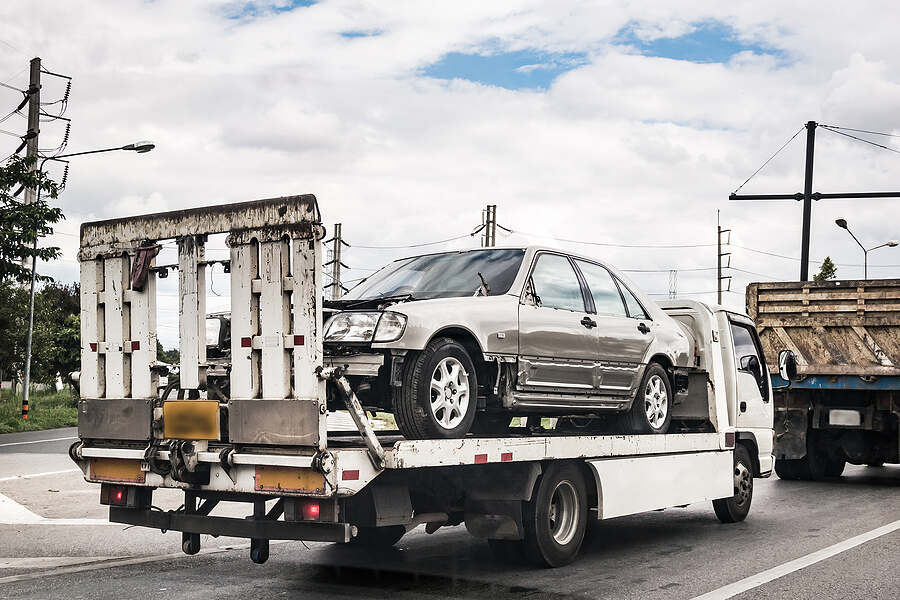June 15, 2022
By Polito & Harrington LLC
Flatbed trucks can cause disastrous collisions that affect multiple victims and other vehicles. When a flatbed crashes, impact from the truck and loose cargo can exacerbate victims’ damages.
What Is a Flatbed Truck?
When it comes to hauling shipments across long distances, various types of trucks can accommodate different types of cargo. A flatbed truck is a standard commercial vehicle used to transport goods, materials, and other freight across the country. Flatbed trucks come in various sizes and lengths, from smaller trucks on just four to six wheels to the longest flatbeds on 18-wheelers.
Most large flatbed trucks range from 48 feet to 53 feet, whereas their smaller counterparts can have beds that are just seven feet long. What distinguishes a flatbed truck from any other commercial vehicle is its cargo goes directly onto the truck’s flatbed. There are no side railings, roof, built-in containers, or other enclosures to contain the shipment. The free space allows for the hauling of sometimes awkward, oversized, or very long loads that cannot otherwise fit in other commercial shipping vehicles.
How Heavy Is a Flatbed Truck?
The weight of a flatbed truck varies depending on the cargo hauled on any given trip. Each state regulates the amount of weight that a flatbed truck can carry. The amount of weight a truck can haul depends on state regulations and the terrain, such as mountainous roads, overpasses, or bridges. On average, most flatbed trucks can carry about 48,000 pounds of cargo per haul.
The Most Common Cargo on Flatbed Trucks
Flatbed trucks allow people to ship materials and cargo that are otherwise impossible to transport. It is always an exciting sight to see a home, helicopter, wind turbine, or other large object hauled on the bed of a truck. While these are not the most common uses for flatbeds, they show the power and unique capabilities of these trucks to meet the demands of shipments for various purposes.
Other cargo flatbeds often carry includes:
- Building and construction materials: Flatbeds often transport large and heavy concrete or metal piping and other materials used to construct buildings, roads, and public systems. A flatbed can usually accommodate many of these massive materials in one load. Rocks, gravel, and stones are also shipped on a flatbed, although these materials must be in sacks or covered in some way to prevent debris from flying onto the road.
- Lumber: The logging industry uses flatbed trucks to transport logs across the country. The length of logs can vary greatly, but these flatbeds can typically haul many logs in one shipment. The loading of logs, in particular, is subject to heavy regulatory rules, and any error or lapse in loading or securing this cargo can result in catastrophe.
- Equipment and large vehicles: The military, construction, oiling, and aviation industries use flatbed trucks to move heavy machinery and vehicles across the country.
- Landscape materials: Flatbeds can haul large trees, sod, rocks, pebbles, mulch, and other landscaping materials to their destinations. The length of the bed and overall hauling power allow these trucks to carry full-grown trees that may be long and heavy.
- Tires: You may not realize it, but used tires can become a community problem. In populated areas, used tires pile up, filling landfills. To reduce the excessive number of tires in landfills, some companies compress them into tire bales and repurpose them for construction, building roads, and preventing erosion. Flatbed trucks haul these tire bales across the country for recycling.
- Trash and scrap: Trash, scrap metal, and other debris get hauled by flatbeds as well. Loose cargo is a hazard because pieces can become dislodged or break off while in transit and become a deadly projectile to occupants in nearby vehicles.
What are the Unique Dangers that a Flatbed Truck Can Pose to Others on the Road?
Flatbed trucks differ from other trucks used for commercial shipping.
The features that allow these trucks to haul loads that otherwise may not fit into a shipping container also create hazards for travelers.
- Limited maneuverability: Operating a flatbed truck is a difficult task that requires skill and experience. These trucks cannot move in the same manner as other vehicles. Sudden jerking or roadblocks can create challenging scenarios for a driver. If a driver does not respond appropriately, they can cause the flatbed to overturn, jackknife, or lose control of the vehicle.
- Loose cargo: Beyond the dangers of the truck itself, other travelers on the road must remain aware of the shipment in the bed of a flatbed truck. Cargo can become loose during transit, which can cause portions of the load to fall onto the road or become airborne and fly into traffic behind the truck.
- Protruding cargo: Since a flatbed truck does not have barriers to contain the load on the sides or from the back, certain materials or objects may protrude beyond the truck’s bed. Protruding cargo is a hazard for vehicles traveling behind or beside the truck since other motorists may not perceive how far the materials extend.
- Blocking visibility of other drivers: When a flatbed truck is at capacity, the load can be very tall, making it difficult for drivers to see around it. Poor visibility can cause vehicles to crash into trucks or one another when trying to pass or change lanes.
What Causes Flatbed Truck Accidents?
Because so many different things can go wrong with a truck and cause an accident, further investigation is often necessary to reveal the reason for the crash. More often than not, passenger vehicles are collateral damage when a trucker loses control on the road, or a driver makes a mistake behind the wheel. Truck driver negligence is the root cause of many flatbed truck accidents.
Certain behaviors commonly occur amongst flatbed drivers that increase the risk of accidents with other travelers, including:
- Distracted driving: Living on the road is the norm for many flatbed drivers. Long-distance shipments and back-to-back jobs can mean that many do not make it back home for weeks at a time. Spending so much time traveling can lead many drivers to take their daily routines on the road, resulting in distractions and a higher likelihood of an accident. Dangerous distractions include eating while behind the wheel, taking phone calls, texting, or watching mobile devices.
- Trucker fatigue: Trucker exhaustion does not just impact productivity but can also cause drivers to have slower reaction times, delayed coordination, or fall asleep behind the wheel. While many government regulations limit the hours a truck driver can spend consecutively on the road, many drivers find ways around the limits, ignore the rules, or take the bare minimum rest, which can cause them to suffer fatigue while operating a flatbed.
- Reckless driving: Truck drivers can feel invincible. After all, they are behind the wheel of a massive vehicle with a higher vantage point and much more power than most other vehicles on the road. However, aggressive driving, speeding, and reckless maneuvers endanger the lives of others in their vicinity on the road.
- Inexperience: Driving a flatbed truck is not the same as operating other vehicles or commercial trucks. Flatbed truck drivers must understand the mechanics and operation of the truck and have the experience to maneuver through obstacles, dangerous weather, and other unexpected challenges that arise. Inexperience can cause flatbed drivers to make lapses in judgment, resulting in an accident.
- Incorrect cargo loading: Loading cargo onto any truck is an intricate process, but no truck is more difficult to load than a flatbed truck. Due to the lack of containment, much of the cargo remains exposed to the environment. Therefore, any failure to distribute the weight correctly on the truck can cause the driver to lose control or drop cargo while traveling down a highway. Flying debris or debris in the road can cause devastating accidents.
- Improper or inadequate maintenance: Flatbed trucks travel long miles and carry heavy loads that cause significant wear and tear on components, truck equipment, and other parts essential for safe transport. Any failures in maintaining a flatbed truck can lead to a flatbed truck accident.
Who Is to Blame for an Accident Involving a Flatbed Truck?
When a truck driver acts negligently, the driver is often responsible for causing the accident. Sometimes, through vicarious liability, their employers are liable as well. However, another party could be at fault when the accident occurs because of poor maintenance, loading, or broken truck parts.
Parties that can be liable in a flatbed accident case include:
- Truck driver
- Trucking company
- Loading or shipping company
- Truck maintenance service
Can You Seek Compensation If You are a Victim of a Flatbed Truck Crash?
If another party’s negligence injures you in a flatbed truck crash, you can probably seek compensation for your losses. Negligence victims may file an action in court against the parties responsible for their losses. However, in many situations, a victim of a flatbed accident might avoid a lawsuit if they can reach a satisfactory settlement with an insurance company. Speak with an experienced lawyer about filing a claim since each state has time limits and rules that regulate how long you have to file a claim after the accident.
Because flatbed truck accidents often involve commercial activity, there is often a commercial liability insurance policy in place to protect the victims of a flatbed collision. With the help of a flatbed truck accident lawyer, you can file a claim for your damages with the insurers to try to resolve your case without the need for a lawsuit.
However, sometimes, insurance companies refuse to make fair settlement offers. In that case, your lawyer might take your case to court. Your lawyer can help you determine the extent of your losses and calculate the damages you incurred because of a flatbed accident.
Damages in a flatbed crash claim or lawsuit can include:
- Medical expenses
- Lost income
- Pain and suffering
- Wrongful death
- Loss of quality of life
- Loss of companionship
- Property damage
If a flatbed truck accident injured you or a loved one, contact a truck accident attorney for a free case consultation. A lawyer can help you figure out what types of compensation you can seek and help you build a strong case to pursue the justice you deserve.

